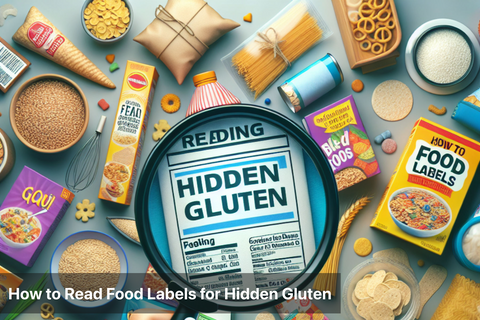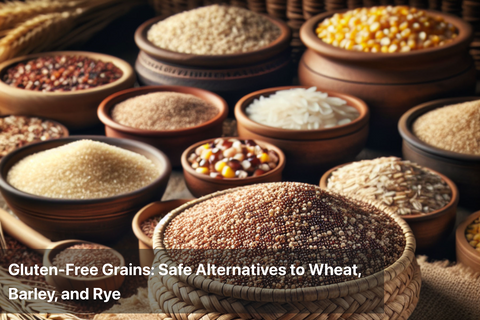
Is Gluten Bad for Everyone? Debunking Common Myths
Gluten has become one of the most misunderstood components of the modern diet. While some people need to avoid it for medical reasons, a growing number of individuals are ditching gluten in the belief that it’s inherently harmful. This trend has given rise to confusion, fear, and misinformation surrounding gluten-containing foods. As gluten-free products flood supermarket shelves and wellness influencers promote gluten-free living, it's important to separate fact from fiction.
For the vast majority of people, gluten is not only safe but also part of a healthy, balanced diet. Understanding what gluten actually is, how it works in the body, and who truly needs to avoid it can help cut through the myths and promote smarter nutrition choices.

What Is Gluten and Why Is It Misunderstood?
Gluten is a naturally occurring protein found in grains such as wheat, barley, and rye. It provides elasticity and structure to baked goods, giving them their chewy texture. Gluten itself is not a toxin or allergen by nature. Its reputation has suffered primarily due to misconceptions and the association with gluten-related disorders.
Much of the confusion stems from a lack of clarity between medical necessity and dietary preference. While a gluten-free diet is essential for those with celiac disease or gluten sensitivity, many people adopt it thinking it will lead to weight loss, improved digestion, or enhanced energy levels—claims not backed by science for the general population.
Understanding the Popular Myths Around Gluten
Numerous myths have contributed to the negative image of gluten. Debunking these myths helps restore a balanced perspective on gluten in the diet.
-
Myth 1: Gluten Is Toxic for Everyone
Gluten is only harmful to individuals with specific conditions. Healthy individuals digest gluten without triggering any immune or inflammatory response. -
Myth 2: A Gluten-Free Diet Is Healthier
Removing gluten does not automatically make a diet healthier. Many gluten-free packaged foods are highly processed, lacking fiber and essential nutrients, and may contain more sugar and fat than their gluten-containing counterparts. -
Myth 3: Gluten-Free Equals Weight Loss
Any weight loss from a gluten-free diet often results from cutting out processed foods, not gluten itself. Replacing these with calorie-dense gluten-free alternatives can lead to weight gain instead.
Gluten and Gut Microbiota: What Science Says
One of the lesser-discussed aspects of gluten consumption is its effect on gut bacteria. Whole grains containing gluten also provide prebiotics—non-digestible fibers that feed beneficial gut microbes. These microbes contribute to immune regulation, nutrient absorption, and inflammation control.
When gluten and its food sources are removed unnecessarily, the gut microbiome may become less diverse. A less diverse gut microbiota has been associated with various health concerns, including metabolic disorders and weakened immunity. For individuals without a medical reason to avoid gluten, whole grains containing gluten can be a valuable source of both nutrition and gut-friendly compounds.
Role of Gluten in Nutrient-Rich Foods
Many gluten-containing foods are key sources of important nutrients. Eliminating them without proper substitution can lead to nutritional deficiencies over time.
|
Nutrient |
Gluten-Containing Sources |
Importance for Health |
|---|---|---|
|
Fiber |
Whole wheat bread, bulgur, wheat bran |
Digestive health, cholesterol control |
|
B Vitamins |
Fortified cereals, whole wheat pasta |
Energy metabolism, brain health |
|
Iron |
Enriched wheat products |
Oxygen transport, energy, immune function |
|
Selenium & Zinc |
Wheat germ, barley |
Antioxidant defense, wound healing |
Cutting these sources without balancing the diet through other whole foods or supplements can lead to fatigue, poor concentration, and weakened immune function.
The Psychological Impact of the Gluten-Free Trend
The rise of gluten-free as a wellness trend has also led to the spread of food anxiety and restrictive eating behaviors. Some individuals, influenced by marketing and social media, develop an aversion to gluten without any clinical symptoms—a behavior often referred to as “orthorexia” when it becomes obsessive.
This mindset can contribute to guilt, social discomfort around food, and an unnecessarily restricted diet. Gluten-free living should be a medically informed choice, not one driven by fear or misinformation.
Gluten-Free Diet and Children: Caution Before Elimination
In children, gluten provides energy, protein, and essential nutrients during crucial developmental years. Removing gluten without a proper diagnosis may lead to unintended consequences such as stunted growth or delayed development due to nutrient shortfalls.
Unless medically necessary, children should not be placed on restrictive diets. Pediatricians and dietitians can help assess whether symptoms like digestive issues or skin rashes are related to gluten or something else entirely.
When Is a Gluten-Free Diet Necessary?
There are three specific medical conditions where avoiding gluten is essential:
-
Celiac Disease: A lifelong autoimmune disorder where gluten causes intestinal damage.
-
Non-Celiac Gluten Sensitivity: Causes discomfort without intestinal damage or immune response.
-
Wheat Allergy: Triggers allergic reactions, potentially including anaphylaxis.
Outside of these diagnoses, eliminating gluten should not be the first solution to nonspecific symptoms. Testing and proper evaluation by a healthcare provider are critical before making long-term dietary changes.

Conclusion: Gluten Isn’t the Enemy for Most
Gluten is not inherently harmful and doesn’t need to be eliminated unless there's a legitimate medical reason. Misconceptions and marketing hype have made gluten seem dangerous, but science tells a different story. Whole grains containing gluten offer important nutrients and gut health benefits that shouldn't be dismissed lightly.
Understanding when and why gluten should be avoided helps prevent unnecessary dietary restrictions and supports better long-term health. With accurate knowledge and balanced choices, individuals can eat confidently—whether their diet includes gluten or not. Lofoods supports every step of this journey by offering reliable, nutritious alternatives for those who do need to go gluten-free, without compromising taste or wellness.
This Blog post is an initiative by Lo! Foods, to provide accurate and Nutritionist / Doctor approved information related to Health. Lo! Foods is India's leading brand for Everyday Functional Foods. Foods designed for specific Health conditions or Needs. Lo! Foods also runs India's largest range of Low Carb Healthy Cloud Kitchens, under the brand names of Lo!, ProteinChef, ATH (All Things Healthy) and DiabeSmart.















Leave a comment
Your email address will not be published.